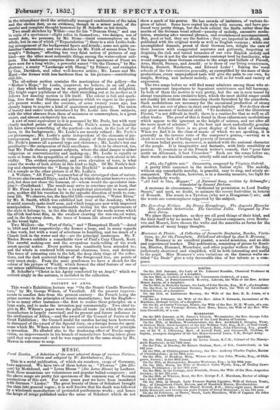MUSIC.
Vocal Exotics. A Selection of the most admired Songs of various Nations. Written and adapted by W. Bartholomew, Esq.
This is a serial publication, of- which six numbers, tongs of Germany, have appeared. We have two of them before us : "Flowers" (Die Mu- rat%) by Methfessel, and " Lotus Bloom " (Die Lotus Blume) by Lachuer. Both these musicians are voluminous and popular ballad-composers ; and the above songs are pretty fair specimens of the common run of German productions of this sort. For some years past we have been inundated with German " Lieder." The great beauty of those of Schubert brought the class into general vogue ; it is well known that his death was followed by a wholesale manufacture of pretended posthumous works ; and hence the heaps of songs published under the name of Schubert which do not show a spark of his genius. He has crowds of imitators, of various de- grees of talent. Some have copied his style with success, and have pro- duced very pretty things, but the bulk exhibit the faults rather than the merits of the German vocal school—paucity of melody, excessive modu- lation, straining after unusual phrases, and overlaboured accompaniment But, good or bad, they are the fashion ; they are imported in shoals, and published with the original words as well as English versions ' • while our accomplished damsels, proud of their German lore, delight the ears of their hearers with exaggerated aspirates and gutturals, forgetting or despising the rich and varied treasures of our own English melody and song. Were it not for the unfortunate contempt bred by familiarity, who would compare these German exotics to the songs and ballads of Purnell, Arne, Shield, Storace, and Arnold; or to those of our living countrymen, Bishop, Barnett, Macfarren, and Edward Loder ? Taking the vocal schools of the two countries generally, as exemplified by the mass of their productions, every unprejudiced taste will give the palm to our own, for simple, flowing, and natural melody, as well as for truth and variety of expression.
The two songs before us will find many admirers among those who at- tach paramount importance to ingenious contrivance and full harmony. In both of them the motive is very pretty, but the ear is soon teased by abrupt transitions into irrelative keys, which the most skilful singer could not readily hit without the connecting chords furnished by the pianoforte. Such modulations are necessary for the occasional production of strong effects, but are out of place in short and simple ballads. Nor do they show any great amount of technical skill. "To modulate," said the illustrious Piceim, "is not difficult in itself; there is a routine for that as well as all other trades. The proof of this is found in those enharmonic modulation.' which appear to the ignorant as the height of science, and are after all the mere sport of scholars." In the best and most undoubtedly genuine songs of Schubert there is no great display of this kind of learning. When we find it in the class of musk of which we are speaking, it is generally in the inverse ratio of the composer's genius,—serving as a cloak to cover lack of feeling and poverty of invention.
German ballad poetry, moreover, is marked with the national character of the people. It is imaginative and fantastic, with little sensibility or passion. It reminds us of the French writer's remark, that " pour faire sentir un Allemand, it faut recorcher." Such are the songs before us; their words are fanciful conceits, utterly cold and scarcely intelligible.


























 Previous page
Previous page